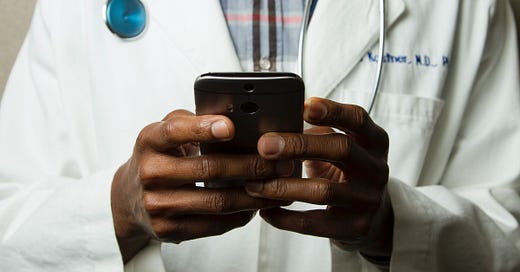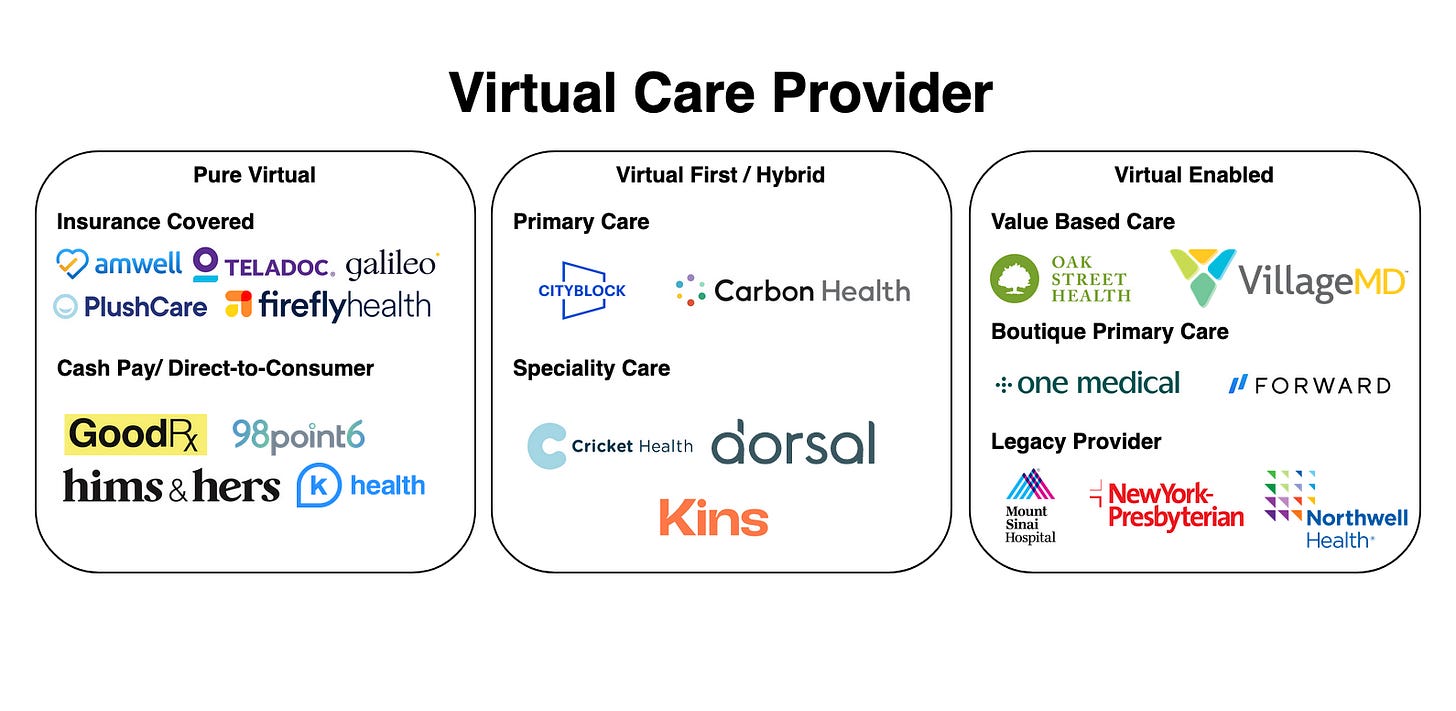Morning Walk #47
Telehealth will dramatically transform the way we receive healthcare. We just don’t know how yet.
Hi. I’m Stepa Mitaki. I’m a product person and an entrepreneur. I’ve been working in 🏙 govtech for eight years and currently work at a UK-based 🏦 fintech startup Silverbird while building a new company in 👩🏼⚕️ health tech on the side.
Morning Walk is a personal weekly newsletter where I share some musings on tech, digital healthcare, working on startups, productivity, some nerdy stuff and an occasional share of reflections on the Ukraine war and how it feels being Russian at this moment in history.
This issue was sent out to 218 subscribers (+1 from the previous week). Last week’s issue received 459 views.
🩺 Telehealth will dramatically transform the way we receive healthcare. We just don’t know how yet.
I don’t think we’ve even seen the tip of the iceberg. I think the potential of what the internet is going to do to society, both good and bad, is unimaginable. I think we’re actually on the cusp of something exhilarating and terrifying.
When we look retrospectively at our ideas of how the internet and technology might improve our everyday experiences, the ideas we had back then now seem straightforward and even dull. In this classic 1999 interview, you could notice how most people, including this reporter from BBC, were thinking of the internet simply as a new delivery system. Unlike David Bowie, most of us couldn’t even grasp how the internet could transform many of our industries. Yet it did in the most profound ways. Retail, music, home video, banking, transportation, travel, you name it.
But our vision for the future back when the internet was at its infant stages now seems too straightforward. The reason is that we’ve often tried to mimic old experiences online or provide identical services using a new distribution channel.
How the internet transformed the service economy
A good example would be how the internet reinvented the service economy over the last twenty years. I highly recommend you read this piece from Andrew Chen outlining this in detail, but here is my quick take on it.
In the past twenty years, we’ve transformed the way people buy goods online, and in the process created Amazon, eBay, JD.com, Alibaba, and other e-commerce giants, accounting for trillions of dollars in market capitalization. The next era will do the same to the $9.7 trillion US consumer service economy, through discontinuous innovations in AI and automation, new marketplace paradigms, and overcoming regulatory capture.
Before the internet, we had Yellow Pages. It simply listed all businesses and their contact information split into several categories in a single book. Yellow Pages owned a discovery process, and it helped us find companies or people based on a theme (e.g., plumbers, babysitters, vacation rentals).
Then, in the early 1990s, Craigslist was launched. That was a complete copy of Yellow Pages. The only difference was instead of a paper it was accessible online.
Obviously, you got some additional benefits of it being online (search and speed of updates) but generally, it was all the same. Craigslist still owned only a discovery process.
In the 2000s came what Andrew calls The Unbundled Craigslist Era. We’ve got companies like Angie’s List, Thumbtack, Fiverr, and Taskrabbit.
What was different is these services started focusing on specific markets within Craigslist (e.g., web developers, home improvement, or home services), and they started owning other stages of the customer journey. Instead of focusing solely on the discovery, they’ve let customers communicate and book offerings using their platform.
From 2009–2015 came “The Uber for X” Era with companies like Uber, Doordash, Lugg, and Glamsquad. And again, what set them apart from the previous contenders in the same space was owning other stages of the user journey. Now, in addition to discovery, communication, and booking, they also owned automated matching and transactions.
And the most recent era began around the mid-2010s will the arrival of companies like honor, trusted, Wonderschool and Opendoor. New stages owned by these companies–trust establishment and active oversight or management of service delivery.
Selling a house in the Craigslist era was very different than during the Opendoor era. As well as calling a cab. And I’m sure most people won’t even imagine how the internet could have changed the experience of these activities.
Where healthcare fits into this
I believe the same will happen in the world of healthcare. Telehealth is just getting started, I firmly believe it’s in its first infant stages, and we can’t even grasp how telehealth could change the healthcare delivery experience for us.
If you look at telehealth in 2022, you will notice it’s all the same but with a different delivery system. Instead of going to the doctor’s office, you call him online. Apart from this, everything else is almost identical.
Yeah, some innovations are popping up (at-home monitoring devices, use of AI, value-based care, etc.), but these are far from mainstream just yet.
95% of telehealth in 2022 is simply video calling your doctor. And it seems primitive. We are using a new distribution channel for an old-age experience of going to your doctor. But what if we start from scratch? Rethink what healthcare might look like in an ideal world with access to modern technologies from the ground up.
How healthcare of the future might look like
Healthcare of the past:
I feel sick.
I go to the doctor.
I pay them for the service provided (consultation, lab test, checkup, etc.).
I feel better
Repeat
Healthcare in an ideal world:
Someone continuously monitors and advises me so that I won’t get sick at all.
Okay. That’s an ideal world. But is it realistic? Is it possible to be healthy 100% of your life? I don’t think it’s plausible in the near (about 60-80 years) future, so the care in an ideal mid-term world might look like this:
The doctor (or some combination of a care team) continuously monitors and advises you not to get sick as long as possible.
The care team makes sure any problem is diagnosed as soon as possible.
If anything happens – intervene.
How could the internet and technology get us closer to this ideal world?
Here are a couple of ways how telehealth could already improve the healthcare delivery experience:
Provide access to the same doctor wherever you are (not very true right now in the US 😬 but still)
Easier access to longitudinal health (you moving somewhere or your doctor moving somewhere is not a big deal anymore)
Better behavioral health (more data points, easier sharing and access to knowledge)
In other words, healthcare ≠ doctor visit anymore. This brings plenty of other advantages as well as challenges, but the key point is that these starting assumptions are just a tip of an iceberg. It will look surprisingly different from what we are used to today. But don't expect robot doctors flying on a drone to your house type of thing. Does Opendoor feel like we are living in a world of flying cars? No. Does it still look way different from the early-internet era? Hell yeah, it does.
I believe we will rethink telehealth and our whole approach to healthcare delivery in the next 10-20 years. And we can't even grasp the kinds of changes we will see in these coming decades. Healthcare will be the most exciting market to be in during these transformative years, and I hope many more phenomenal founders will join this challenge.
Related reading
The state of telehealth: digital providers, their communication tech stack & future trends
The title says it's all—an excellent summary of where telehealth is right now. And I'm pretty convinced we are at the very early stages, and the complete rethinking of telehealth will happen in the next 5-10 years. Telehealth shouldn't even be a word. It's not a new model to receive care, but rather how you could leverage technology to rethink care delivery altogether.
Telehealth breaks the "health care = doctor visit" pattern: As touch points with a doctor become much more manageable, this paves the model for continuous care.
🗯 Promo
All-In Write-Ups
Weekly write-up over the All-In Podcast, in which industry veterans cover all things economic, tech, political and social.
My First Million Write-Ups
Weekly write-up over the MFM Podcast, in which entrepreneurs discuss business breakdowns, company-building ideas, and interview founders.
That’s it for today. Thanks for reading. Until next week 👋🏻
This post is public so feel free to share it.







